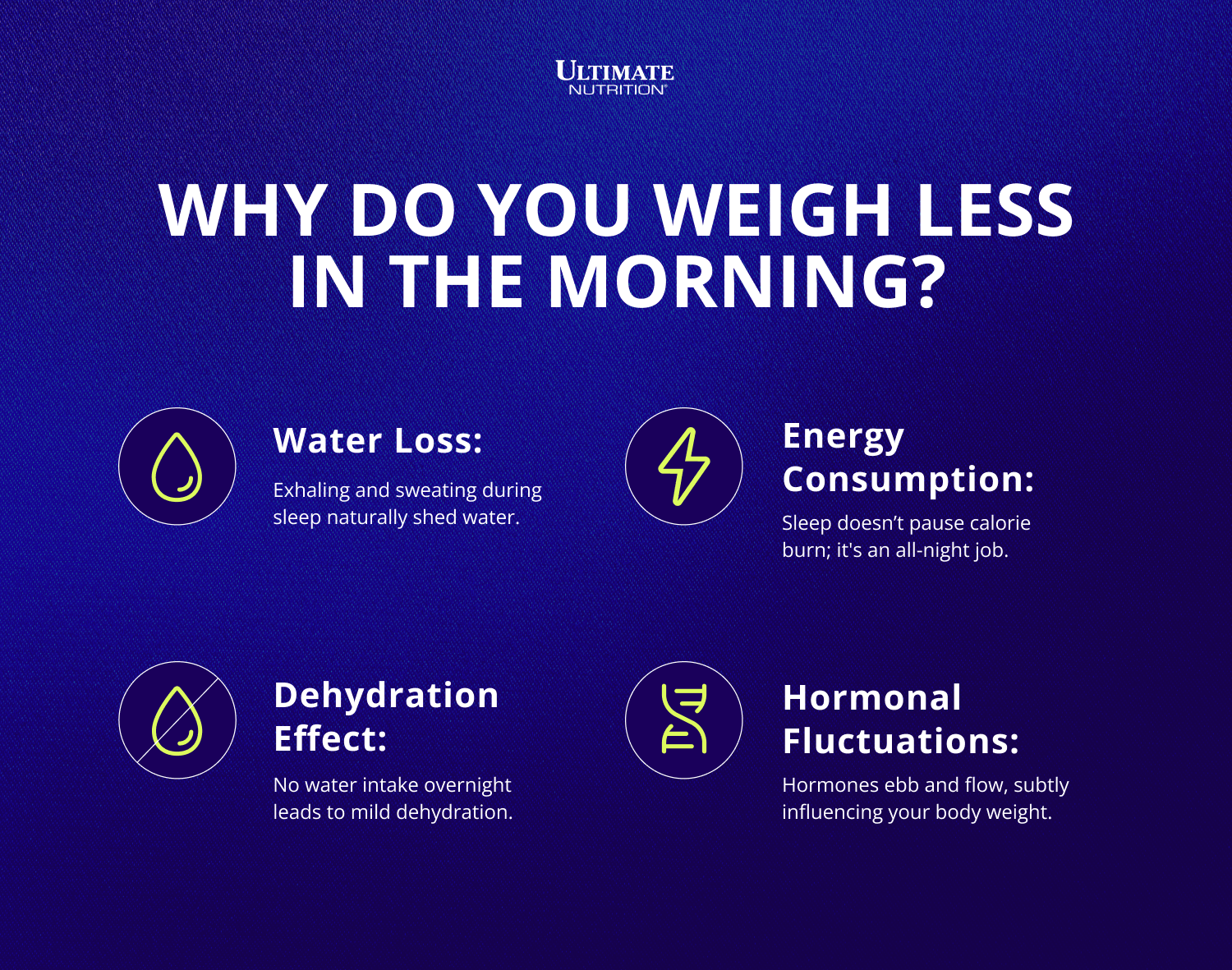Weighing yourself can quickly become a daily ritual.
If you're consistent with this habit, you might have noticed something peculiar: your weight is slightly lower in the morning.
Have you ever wondered why? The slight decrease in morning weight is often due to overnight water loss from respiration and perspiration, combined with energy burned for vital bodily functions during sleep.
Let’s explore the science behind this and understand what it means for your overall health and fitness goals.
Why Do You Lose Weight Overnight?
Many factors contribute to why we often weigh less after waking up. It's not just about losing fat overnight but a combination of physiological processes that occur while we're asleep.

Water Loss Through Respiration and Perspiration
One of the main reasons for morning weight loss is the water weight your body loses overnight. You're continuously losing water as you breathe and sweat in your sleep.
While this might not account for a significant drop in pounds, it makes a difference on the scale.
- Respiration: Each time you exhale, you lose a bit of water vapor. Throughout the night, this adds up.
- Perspiration: Even in a well-regulated sleep environment, your body sheds water through sweat. This is part of your body's natural temperature regulation.

Energy Consumption While Sleeping
Your body never really "shuts off." Even during sleep, it's hard at work repairing cells, digesting food, and maintaining essential bodily functions.
All these processes require energy, which your body derives from stored resources. This metabolic activity can lead to a slight decrease in weight by morning.

Dehydration Effect
Dehydration overnight can contribute to a lower morning weight. While you sleep, you're not drinking water, which can lead to mild dehydration in the morning.
Hormonal Fluctuations
While you sleep, hormones like cortisol rise, potentially boosting metabolism slightly. Simultaneously, melatonin aids in regulating sleep and metabolism.
The balance of ghrelin and leptin, which control hunger and fullness, also shifts overnight. These hormonal changes contribute to minor fluctuations in your weight by morning.
How Much Does Weight Fluctuate From Night to Morning?
The difference in weight between night and morning can be pretty significant. On average, a person can expect to see a fluctuation ranging from 1 to 4 pounds.
Here's what contributes to these fluctuations:
Meal and Fluid Intake
The impact of what you eat and drink throughout the day on your body weight is more significant than you might think. Here's a closer look:
Immediate Weight Gain
Immediately after a meal or drinking fluids, your body weight will increase. For instance, if you drink a 16-ounce glass of water, that's an instant pound added.
Carbohydrate and Salt Intake
Foods high in carbohydrates and salt can lead to water retention. For every gram of carbohydrate stored in the body as glycogen, about 3 to 4 grams of water may be stored with it.

Physical Activity
Physical activity, particularly intense exercise, can have a surprising effect on your weight, both immediately and over time:
Water Retention in Muscles
After an intense workout, your muscles may retain water as part of the recovery process. This is a natural response to healing microtears in muscle fibers.
Sweat Loss
Conversely, during a workout, you lose water through sweat. Perspiration can cause a temporary decrease in weight.
For instance, an hour of intense exercise can result in a loss of anywhere from 16 ounces to over 2 pounds through sweat, depending on the intensity and environmental conditions.
Digestive Process
The process of digestion and subsequent waste elimination also plays a role:
Weight of Consumed Food
The physical weight of your food will add to your body weight until it is digested and waste is expelled. For example, a typical meal can weigh anywhere from 1 to 2 pounds.
Digestive Timeline
The digestive process can take anywhere from 24 to 72 hours, depending on the individual's metabolism and the type of food consumed. This means the weight of a meal can temporarily reflect on the scale for a day or more.

Meet Your Ideal Body Weight With Ultimate Nutrition
As we've seen, your morning weight is influenced by various factors, from water loss to metabolic processes.
While it’s a useful metric, remember it’s only part of your health and fitness story. As you pursue your goals, whether it’s weight loss, muscle gain, or maintaining your current physique, consider how incorporating Ultimate Nutrition protein powders can complement your diet and training, providing essential support for your body’s needs.
A few of our favorite weight loss supplements include:
- Best Yohimbe Supplement
- Gold Burn: A Fat Burning Supplement
- L-Carnitine: An Amino Acid Supplement
- Ultra-Ripped: A Thermogenic Fat Burner
Furthermore, our blog will load you with all the tips you need, including how to boost your resting metabolism. Embrace this knowledge, and use it to fuel your journey towards a healthier, stronger you.
The information provided in our articles are meant for informational and educational purposes exclusively and should not be considered as medical advice. It is essential to consult a healthcare professional before starting a new nutritional product and/or making significant changes to your diet and/or starting a new exercise regime. These products are not intended to diagnose, treat, cure, and/or prevent disease.





















